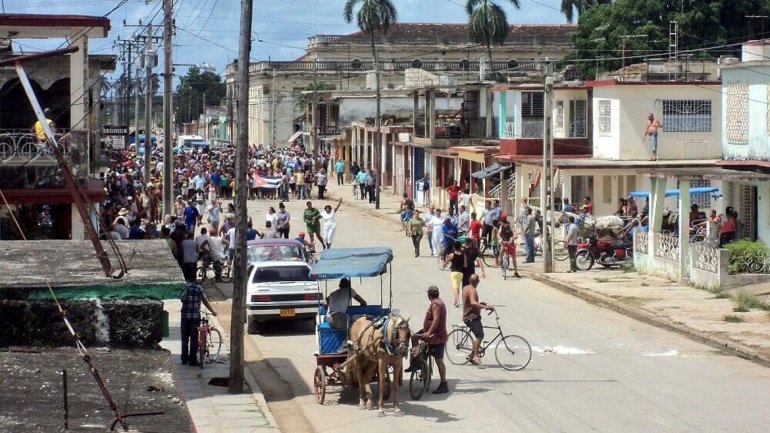“The sale of industrially manufactured products , or purchased abroad by seamstresses or tailors , plumbers and producers or sellers of sundry household use will constitute an infringement and will lead to the implementation of a contravention of who performs the activity ” explained the Deputy Minister of Labour, Marta Elena Feito, in the official newspaper Granma .
Meanwhile ministry adviser , José Barreiro, said that “the measure became effective for immediate implementation as described in the Rules of Self-Employment and the Penal Code.” Officials did not specify the amount of the fines.
The Administration banned the retail sale of clothing and other items imported , fostering unemployment and the black market : ” This will force them to do anything,” warned many of these self-employed who had believed and had ventured to participate in the new openings of the regime Castro and his new vice-administrator Diaz- Canel .
The Cuban government seems ready to her first serious clash with the newly created non-state sector small business after the announced ban on the sale of clothing and other items imported .
The decree issued last week potentially affects more than 20,000 businesses that sell clothing , equipment and other items brought informally by travelers , some of whom visit the Caribbean island regularly to bring goods from the United States, Spain and countries of Latin America.
Both employers and employees and customers were angry about the new ban in the district of Centro Habana , where several dozen vendors had settled on a vacant lot to sell clothes , shoes and underwear.
” We call on the authorities to re- think . We have many products and much money invested in this,” said Justo Castillo, representative of the trade union federation that has tried to organize the self-employed .
“Banning it means unemployment for these people , and force them to do anything. They will black market will return to illegal activities ,” he said to cheers from the crowd that gathered as he spoke.
The regulation includes a new list of authorized types of self-employment and descriptions, including phrases to stop the import and resale items.
For example , the job description of the dressmaker has now added “does not include the sale of clothing manufactured or imported .”
The public is outraged by the measure. ” Gone is the opportunity to buy a pair of shoes or a pair of jeans ( jean ) worthwhile ,” said retired Ramon , who asked that his last name not be used .
Even government allies oppose . Such is the case with official blogger Yohandry Fontana. ” I wonder if it would be easier to pass the self-employed selling imported clothes to throw this black market activity ,” he wrote on his Twitter account .
Three years ago , the government of Raul Castro , who replaced his brother Fidel in 2006 , opened retail services to the ” self-employment ” in the form of 200 licensed activities from clowns , dressmakers , food vendors and construction trades to small businesses such as restaurants , cafes , bed & breakfasts and entertainment services . The measure is intended to absorb excess state work , improve services, eliminate inefficiencies and exposing black market activities .
There are currently 436,000 self-employed people , of which about 100,000 work as small business employees , according to the government. Residents entrepreneurs have taken advantage of some of the categories , such as dressmaker and sellers of household effects, to provide clothing and imported with greater variety and a lower price than the state.
Therefore, the ban appears aimed at protecting the state monopoly on the sale, both wholesale and retail , import goods , which has resulted in a widespread black market due to the exorbitant prices and questionable quality.
Sources:Reuters/Infobae/Argentina/InternetPhotos/www.thecubanhistory.com
CUBA: “OPENING POLICY” Didn’t Last Long
The Cuban History, Arnoldo Varona, Editor
Foto de Gaby Tizze El “Nicho”, Cienfuegos. 
CUBA: UNA “APERTURA” QUE DURO POCO
“La venta de productos de factura industrial, o comprados en el exterior por modistas o sastres, plomeros y productores o vendedores de artículos varios de uso del hogar, constituirá una infracción y llevará a la aplicación de una contravención a quien realice esa actividad”, le explicó la viceministra de Trabajo, Marta Elena Feito, al diario oficial Granma.
Por su parte un asesor del ministerio, José Barreiro, destacó que “la medida entró en vigor para su ejecución inmediata, según lo descrito en el Reglamento del Trabajo por Cuenta Propia y en el Código Penal”. Los funcionarios no precisaron el monto de las multas.
La Administración prohibió la venta minorista de ropa y otros artículos importados, fomentando el desempleo y el mercado negro: “Esto los forzará a hacer cualquier cosa” advirtieron muchos de estos cuentapropistas que habian creido y se habían aventurado en participar en las nuevas aperturas del regimen de Castro y su vice-administrador Diaz-Canel.
El gobierno cubano parece dispuesto a su primer choque serio con el recién creado sector no estatal de negocios pequeños luego de la anunciada prohibición de la venta de ropa y de otros artículos importados.
El decreto promulgado la semana pasada afecta potencialmente a más de 20.000 negocios que venden ropa, equipos y otros artículos traídos de manera informal por viajeros, algunos de los cuales visitan la isla caribeña con regularidad para traer mercancía de Estados Unidos, España y países de América Latina.
Tanto los empresarios como sus empleados y clientes se mostraron furiosos por la nueva prohibición en el distrito de Centro Habana, donde varias docenas de vendedores se habían establecido en un solar yermo para vender ropa, zapatos y ropa interior.
“Hacemos un llamado a las autoridades para que vuelvan a pensarlo. Tenemos muchos productos y mucho dinero invertido en esto”, dijo Justo Castillo, representante de la federación sindical que ha tratado de organizar a los cuentapropistas.
“Prohibir esto significa el desempleo para estas personas, y los forzará a hacer cualquier cosa. Ellos pasarán al mercado negro, regresarán a las actividades ilegales”, dijo, entre los aplausos de la multitud que se congregó mientras él hablaba.
La regulación incluye una nueva lista de tipos autorizados de cuentapropismo y sus descripciones, incluyendo frases para detener la reventa e importación de artículos.
Por ejemplo, la descripción del trabajo de la modista ha añadido ahora “no incluye la venta de ropa manufacturada o importada”.
El público también está indignado por la medida. “Se acabó la oportunidad de comprar un par de zapatos o un pitusa (jean) que valgan la pena”, dijo el jubilado Ramón, quien pidió que no se usara su apellido.
Hasta los aliados al gobierno se oponen. Tal es el caso del bloguero oficialista Yohandry Fontana. “Me pregunto si no sería más fácil aprobar al cuentapropista que vende ropa importada que lanzar esta actividad al mercado negro”, escribió en su cuenta de Twitter.
Hace tres años, el gobierno de Raúl Castro, quien reemplazó a su hermano Fidel en el 2006, abrió los servicios del mercado minorista al “cuentapropismo” en forma de 200 actividades con licencia, desde payasos, modistas, vendedores de comida y oficios de construcción hasta pequeños negocios tales como restaurantes, cafeterías, bed & breakfasts y servicios de entretenimiento. La medida se proponía absorber el exceso de labor estatal, mejorar los servicios, eliminar ineficiencias y sacar a la luz actividades del mercado negro.
En estos momentos hay 436.000 personas empleadas por cuenta propia, de las cuales alrededor de 100.000 trabajan como empleados de negocios pequeños, de acuerdo con el gobierno. Residentes emprendedores han aprovechado algunas de las categorías, como por ejemplo modista y vendedores de efectos domésticos, para ofrecer ropa y artículos importados con mayor variedad y a un precio más bajo que el Estado.
Por eso, la prohibición parece dirigida a proteger el monopolio estatal en la venta, tanto al por mayor como al por menor, de artículos de importación, lo cual ha resultado en un mercado negro generalizado debido a los precios exorbitantes y la dudosa calidad.
Sources:Reuters/Infobae/Argentina/InternetPhotos/www.thecubanhistory.com
CUBA: “OPENING POLICY” Didn’t Last Long
The Cuban History, Arnoldo Varona, Editor





